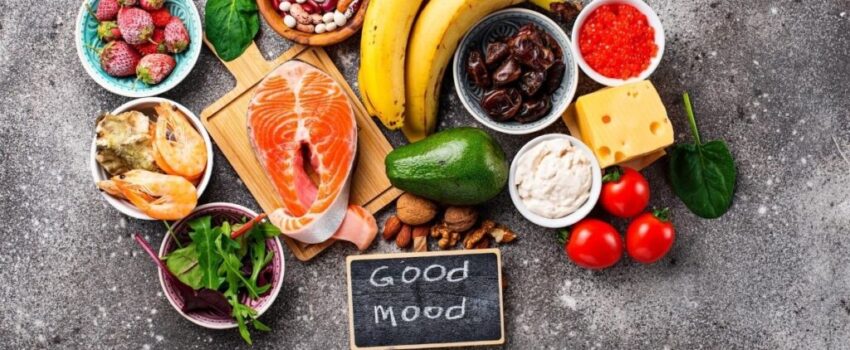10 Foods That Boost Serotonin and Improve Your Mood

Published August 18th, 2020
Health, as defined by the WHO, is “a state of complete physical, mental and social well-being and not merely the absence of disease or infirmity.” Simply put, it’s an all-encompassing term that refers to the holistic well-being of a person.
With the help of research, mental health and mood have become prominent talking points in the world today. One of those research pieces goes into detail about how nutrition affects these two.
The key finding is that the nutritional makeup of food can affect the balance of chemicals in your body, causing you to feel a certain way. Serotonin is one of those chemicals. Let’s get to know this guy a little more.
What is serotonin?
Serotonin is a neurotransmitter, a chemical messenger that sends signals and information throughout the body. This chemical helps regulate many bodily functions, as having ideal serotonin levels can:
- promote good sleeping habits by helping regulate your circadian rhythm
- help regulate appetite
- moderate moods
- help suppress or inhibit pain
- promote prosocial behavior
On the other hand, low or insufficient serotonin levels can lead to the following:
- mood instability
- depression
- anxiety
- schizophrenia
- memory issues
- sleep problems
- sexual issues
- attention
- hyperactivity
How do food and nutrition affect serotonin?
Foods do not inherently contain serotonin, but they contain tryptophan. Tryptophan is an essential amino acid important in producing serotonin. It also plays a crucial role in brain function and healthy sleep.
Our bodies cannot manufacture this amino acid on its own, so we have to get it from the food we eat.
Eating a healthy and balanced diet benefits us physically, which in turn improves our mental health. You will want to ensure that you’re getting enough tryptophan to get ample boosts in energy levels, mood, and sleep quality.
What foods can boost serotonin levels?
Nuts and Seeds
Nuts are seeds are rich in healthy fats, vitamins, minerals, and fiber. Additionally, they’re also rich in protein, including the amino acid tryptophan. In fact, nuts and seeds are some of the most tryptophan-dense foods out there. Just one cup of pumpkin and squash seeds packs 265% of our reference daily intake (RDI) of tryptophan! The best nuts and seeds to eat for this are:
- chia
- sesame
- sunflower
- flaxseed
- pistachio
- cashew
- almonds
- hazelnuts
Soy and Tofu
Products containing soy, including soybeans, tofu, soymilk, and soy sauce, are good sources of tryptophan. Soy can be an ideal replacement for meat in many dishes and is an excellent option for vegetarians and vegans.
Milk and Dairy products
Dairy products are packed with nutrients. Aside from tryptophan, dairy is a good source of calcium, vitamin D, and riboflavin. A cup of mozzarella cheese gives 269% of the tryptophan RDI. Other dairy products you should think about adding to your diet are the following:
- Parmesan cheese
- Cheddar cheese
- Swiss cheese
- Feta cheese
- Whey
- Cottage cheese
- Ricotta cheese
- Milk

Red Meat
Red meat is some of the most nutritious food out there. It is loaded with vitamins, minerals, antioxidants, and many other nutrients. A 3.5-ounce or 100-milligram serving can give you different types of vitamin B, zinc, and iron. When it comes to tryptophan, a 3-ounce portion of lamb shoulder can give you 126% of your RDI for tryptophan. Other red meats you might want to try are:
- rabbit
- lean roast beef
- ground pork
- goat
- wild boar
- veal
Poultry
Turkey stands out as the poultry people associate with tryptophan and serotonin. People become drowsy after a turkey dinner apparently because of how tryptophan-packed turkey is. Other poultry you can think of including are:
- chicken
- goose
- duck
Fish and Seafood
Fish is naturally loaded with omega-3 fatty acids and vitamins D and riboflavin. It is also rich in calcium and several other minerals. They’re so rich in omega-3 fatty acids that the American Heart Association recommends eating two servings of fish per week.
Other seafood, particularly shellfish, are also packed with nutrients. They’re packed with lean protein, healthy fats, and minerals. Regular consumption of shellfish reportedly boosts immunity, aids weight loss, and promote overall health.
Some of the most tryptophan-rich fish and seafood are the following:
- tuna
- halibut
- salmon
- trout
- crab
- spiny lobster
- octopus
- clams
Oats
Over the past few years, oats have gained a reputation as a popular “health food.” And that isn’t without reason. Oats have fantastic health benefits for your heart and in lowering cholesterol levels. A cup of oat bran can provide 113% of the RDI for tryptophan. Other oat types you can have are:
- wheat germ & whole oats
- buckwheat
- wheat bran
- oat cereal
Beans and Lentils
Beans, lentils, and legumes are great and cost-effective food options, packed with protein, iron, fiber, and vitamins. They also contain antioxidants and are beneficial for heart health. In terms of tryptophan, a cup of white beans provides 74% of your RDI. Other beans rich in tryptophan are:
- cranberry beans
- yellow beans
- pinto beans
- kidney beans
- black beans
- lentils
Eggs
Eggs are a nutrient-dense food, packed with vitamins and minerals, including vitamin D, riboflavin, and folate. They’re also a great source of protein, providing about 6.3 grams in a single egg. For every two eggs, you get 60% of your RDI for tryptophan.
Pineapple
Pineapple is one of the fruits that are excellent sources of tryptophan. It also contains a protein called bromelain, which is known for its anti-inflammatory properties. Other fruits rich in tryptophan are:
- plantains
- bananas
- kiwi
- plums
Additional Information
The best way to maximize serotonin levels in our body is to eat tryptophan-rich food alongside carbohydrates. Tryptophan is processed in the gut to become serotonin. The resulting serotonin needs carbohydrates, or energy, in order to travel to the brain.
Another tip is to protect your gut’s integrity. What that means is feeding your gut with nutritious foods and avoiding harmful foods that mess up its balance. You should:
- Eat foods rich in prebiotics and probiotics, as they populate your gut with good bacteria. Foods rich in prebiotics include garlic, onions, bananas, and more. Probiotic-rich foods include kimchi, sauerkraut, and yogurt, among others. Probiotic supplements are also a viable option.
- Limit foods that negatively change your gut microbiome, or the makeup of all bacteria that populate it. Avoid foods high in trans fat and processed and refined sugars.
Other ways you can naturally increase serotonin levels in your body are through:
- Aerobic exercises, such as swimming, jogging, bicycling, and brisk walking
- Expose yourself to bright lights. Research suggests that serotonin levels are lower in winter, which is generally darker than in summer. Basking in the sunlight for a few minutes a day with some sunscreen should boost your serotonin levels.
Benefit From The Latest Advancements In Probiotic Science With Bionaze
Bionaze is a proprietary blend of probiotics proven to promote ear, nose, and throat health, improve digestion, and support your immune system. The active ingredients BLIS K12, and BL-04 are considered among the best probiotics according to science.
Get 25% Off Your First Order when you use BIO25 at checkout!

This Content Has Been Reviewed For Factual Accuracy
This content has undergone thorough fact-checking by our team of internal experts. Learn more about the meticulous editorial standard for our website here.
ADVERTISEMENT

About The Author
Judy Ponio is a professional writer based in the Philippines. Her commitment to communicating factual content in when writing is unmatched. She works hard to cross check reputable sources to ensure her work uses accurate facts.




